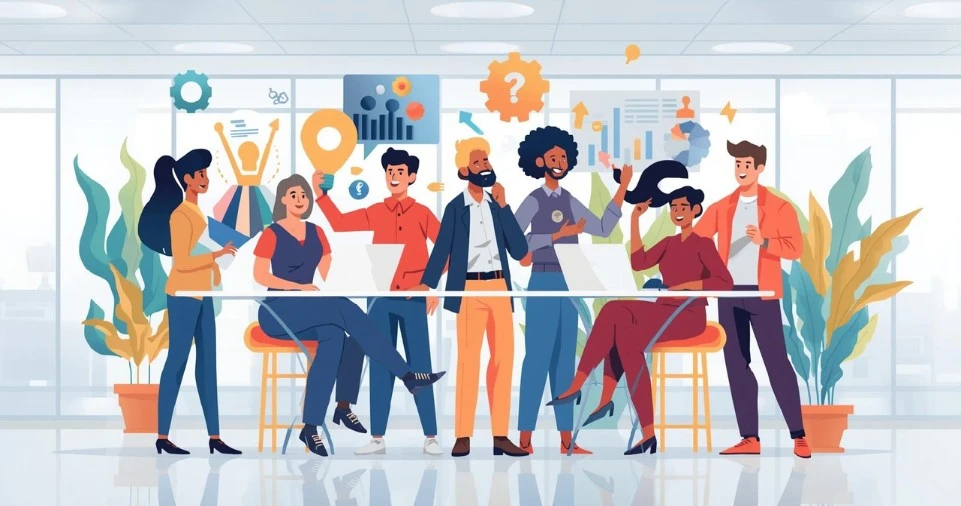The modern workplace is experiencing unprecedented transformation. With 89% of companies reporting leadership gaps and 55% calling it urgent, according to research from the Josh Bersin Company, organizations face a critical challenge: developing leaders equipped for an uncertain future.
Gone are the days when traditional management skills alone could carry leaders through their careers. Today’s business environment—shaped by artificial intelligence, remote work models, generational diversity, and rapid technological change—demands a new breed of leaders who can navigate complexity while inspiring teams toward shared goals.
This comprehensive guide explores the essential skills for modern organizations, drawing on insights from leadership development experts, recent workplace trends, and proven strategies that companies worldwide are implementing to build future-ready leadership pipelines.
Whether you’re an aspiring leader, a human resources professional, or a senior executive responsible for talent development, this article provides actionable frameworks to cultivate the competencies that separate thriving organizations from those struggling to keep pace.
The Evolution of Leadership: From Command to Collaboration
Traditional vs. Modern Leadership Paradigms
Leadership has fundamentally shifted from hierarchical command structures to collaborative, people-centered approaches. This evolution reflects broader societal changes, including:
- Increased emphasis on individual rights and autonomy
- Recognition that diverse perspectives drive innovation
- Understanding that empowerment outperforms control
- Acceptance that vulnerability and authenticity build trust
Modern leaders don’t just direct—they inspire, coach, and enable their teams to achieve collective potential. This shift accelerated during the pandemic and continues reshaping organizational cultures globally.
Current Trends Reshaping Leadership
Three major forces are redefining what effective leadership looks like:
1. Globalization and Cultural Diversity Organizations now manage teams distributed across continents, with up to five generations collaborating daily. Leaders must develop profound cultural intelligence and master the dynamics of global markets while fostering cohesive team dynamics among culturally diverse members.
2. Digital Transformation and AI Integration Technology progresses at unprecedented speed, requiring leaders to be proficient in digital literacy while inspiring innovation. The World Economic Forum estimates over 1 billion people will need reskilling by 2030, making continuous learning non-negotiable.
3. Changing Workforce Expectations Modern employees, especially younger generations, seek meaning in their work. They demand transparency, purpose-driven missions, work-life balance, and leaders who demonstrate emotional intelligence alongside technical competence.
The 10 Essential Skills Every Modern Organization Needs

1. Emotional Intelligence: The Foundation of Effective Leadership
Emotional intelligence (EI) represents the cornerstone of modern leadership capability. Research shows that emotional intelligence is twice as important as IQ when it comes to job performance.
Core Components of Emotional Intelligence:
- Self-awareness: Understanding your emotions, strengths, weaknesses, and impact on others
- Self-regulation: Managing emotional responses and maintaining composure under pressure
- Empathy: Recognizing and understanding others’ emotions and perspectives
- Social skills: Building relationships, navigating social dynamics, and influencing positively
- Motivation: Maintaining drive and inspiring others toward shared objectives
Practical Application:
Leaders with high emotional intelligence can address conflicts constructively, motivate diverse teams, and create inclusive environments where all voices are valued. They recognize unique strengths and needs of team members, inspiring loyalty and commitment through genuine understanding.
Development Strategy:
Organizations can cultivate emotional intelligence through:
- 360-degree feedback processes
- Coaching and mentorship programs
- Team-building exercises focused on empathy
- Conflict resolution training
- Mindfulness and self-reflection practices
2. Digital Literacy and Technological Fluency
Digital literacy has become a cornerstone skill for leaders navigating the digital age. Leaders don’t need to become technical experts, but they must understand how technology impacts their industry and organization.
Key Aspects of Digital Literacy:
- Understanding emerging technologies (AI, machine learning, automation, blockchain)
- Evaluating digital solutions for organizational needs
- Guiding teams through technological transitions
- Leveraging data analytics for informed decision-making
- Recognizing cybersecurity implications and risks
Real-World Impact:
Companies embracing digital transformation with digitally literate leaders report 40% reduction in review cycles and significant improvements in operational efficiency. Leaders who leverage digital tools effectively can streamline processes, enhance communication, and maintain competitive edges.
Building Digital Fluency:
- Participate in technology workshops and certifications
- Experiment with AI-powered tools relevant to your industry
- Stay informed about technological trends through industry publications
- Create innovation labs for safe experimentation
- Partner with IT departments for cross-functional learning
3. Adaptability and Resilience: Thriving Through Uncertainty
McKinsey’s State of Organizations 2023 report reveals that adaptable employees have a significant edge in managing change and adversity. Organizations demonstrating adaptability can absorb shocks and transform them into opportunities for sustainable growth.
Why Adaptability Matters:
In environments defined by:
- Pandemic disruptions
- Geopolitical tensions
- Climate change impacts
- Rapid technological evolution
- Market volatility
Leaders must remain composed under pressure, pivot strategies quickly, and guide teams through instability with confidence and clarity.
Characteristics of Resilient Leaders:
| Trait | Description | Business Impact |
|---|---|---|
| Growth Mindset | Views challenges as learning opportunities rather than obstacles | Increased innovation and experimentation |
| Emotional Regulation | Maintains composure during crises | Better decision-making under pressure |
| Cognitive Flexibility | Comfortable with ambiguity and changing circumstances | Faster strategic pivots and adaptation |
| Recovery Speed | Bounces back quickly from setbacks | Minimized disruption and downtime |
| Positive Outlook | Maintains optimism while being realistic | Higher team morale and engagement |
Building Resilience:
Leaders can develop resilience through:
- Stress management training
- Building support networks
- Practicing scenario planning
- Embracing calculated risks
- Celebrating intelligent failures as learning experiences
4. Strategic Thinking and Visionary Planning
Strategic thinking extends beyond immediate tasks, focusing on grasping broader contexts and long-term implications. Leaders with strategic capabilities excel at discerning growth opportunities, foreseeing obstacles, and formulating innovative strategies.
Components of Strategic Leadership:
- Market Analysis: Understanding trends, competitive landscapes, and emerging opportunities
- Critical Evaluation: Assessing multiple scenarios and potential outcomes
- Long-term Vision: Maintaining clear foresight of future possibilities
- Resource Allocation: Making informed decisions about investments and priorities
- Stakeholder Alignment: Ensuring organizational goals align with stakeholder interests
Strategic Planning Process:
Vision → Analysis → Strategy Development → Implementation → Evaluation → Adjustment
Practical Example:
A retail organization facing e-commerce disruption might:
- Analyze consumer behavior shifts (data showing 67% prefer online shopping)
- Identify digital transformation opportunities
- Develop omnichannel strategy
- Implement phased technology rollout
- Measure customer engagement metrics
- Adjust based on performance data
This strategic approach ensures the organization remains competitive while meeting evolving customer expectations.
5. Communication Excellence: The Bridge to Understanding
Transparent, clear, and consistent communication ensures all team members understand roles, responsibilities, and organizational direction. Research indicates that effective communication ranks among the top three factors in employee satisfaction and organizational success.
Modern Communication Challenges:
| Challenge | Solution | Tools & Techniques |
|---|---|---|
| Hybrid Work Models | Master digital communication platforms | Zoom, Slack, Microsoft Teams, Asana |
| Cultural Differences | Develop cross-cultural communication skills | Cultural intelligence training, language support |
| Information Overload | Prioritize clarity and conciseness | Structured messaging frameworks, bullet points |
| Generational Gaps | Tailor communication styles to audiences | Multi-channel approaches, varied formats |
| Remote Team Engagement | Foster connection despite distance | Virtual coffee chats, video updates, regular check-ins |
Communication Best Practices:
- Active Listening: Give full attention, ask clarifying questions, reflect back understanding
- Constructive Feedback: Provide specific, actionable, timely input focused on growth
- Transparent Updates: Share information proactively, including challenges and uncertainties
- Tailored Messaging: Adapt communication style to audience needs and preferences
- Two-Way Dialogue: Encourage questions, feedback, and open discussion
Development Opportunity:
Consider formal education such as online master’s degree in organizational leadership, which equip leaders with tools and techniques to navigate communication complexities, mediate conflicts, and foster collaboration across diverse teams.
6. Innovation and Creative Problem-Solving
Innovation drives organizational success in the modern era. Effective leaders create environments where creativity thrives, encouraging teams to think beyond conventional boundaries and explore novel solutions.
Building an Innovation Culture:
Key Principles:
- Embrace calculated risks without fear of failure
- View setbacks as valuable learning experiences
- Provide resources for experimentation
- Celebrate creative successes publicly
- Foster psychological safety for idea sharing
- Challenge conventions and established processes
Innovation Framework:
- Identify Problem: Clearly define the challenge or opportunity
- Divergent Thinking: Generate multiple potential solutions without judgment
- Convergent Analysis: Evaluate options against criteria
- Prototype: Create small-scale tests of promising solutions
- Iterate: Refine based on feedback and results
- Scale: Implement successful innovations broadly
Real-World Example:
3M’s famous “15% time” policy allows employees to spend 15% of work time on passion projects. This approach generated innovations like Post-it Notes, demonstrating how organizational support for creativity yields breakthrough products.
Modern organizations can implement:
- Innovation labs
- Hackathons
- Pilot programs
- Cross-functional brainstorming sessions
- Idea management platforms
7. Inclusive and Collaborative Leadership
Modern organizations showcase unprecedented diversity, with teams spanning cultures, generations, geographies, and backgrounds. Inclusive leadership creates competitive advantages through improved innovation, employee engagement, and market understanding. A McKinsey study underscores that organizations with diverse, inclusive teams are 35% more likely to outperform those without such teams. This demonstrates the business case for prioritizing collaboration and inclusion.
Dimensions of Inclusive Leadership:
- Cultural Intelligence: Understanding and valuing diverse perspectives and communication styles
- Psychological Safety: Creating environments where all team members feel safe contributing ideas
- Equitable Opportunities: Ensuring fair access to development, advancement, and resources
- Collaborative Mindset: Breaking down silos and facilitating cross-functional cooperation
- Authentic Curiosity: Genuinely seeking to understand different viewpoints and experiences
Benefits of Inclusive Leadership:
| Outcome | Measurable Impact |
|---|---|
| Innovation | Diverse teams generate 19% more revenue from innovation |
| Employee Retention | Inclusive cultures see 22% lower turnover rates |
| Decision Quality | Diverse groups make better decisions 87% of the time |
| Market Understanding | Better serve diverse customer bases and expand markets |
| Employer Brand | Attract top talent across demographic groups |
Strategies for Building Inclusion:
- Recruit Diverse Candidates: Actively seek talent from varied backgrounds
- Provide Inclusion Training: Address unconscious biases and build cultural competence
- Support Work-Life Balance: Offer flexible arrangements (remote work, flexible hours)
- Create Dialogue Platforms: Establish forums for sharing experiences and ideas
- Embed DEI Metrics: Track representation, advancement, and engagement across groups
8. Data-Driven Decision Making
Future-ready leaders balance intuition with analytics, understanding how to interpret data, identify meaningful patterns, and make evidence-based decisions. This skill becomes increasingly critical as organizations generate exponential data volumes.
The Data Leadership Equation:
Domain Expertise + Data Literacy + Critical Thinking = Informed Decision Making
Key Data Capabilities:
- Data Interpretation: Reading reports, dashboards, and analytics effectively
- Pattern Recognition: Identifying trends, correlations, and anomalies
- Statistical Understanding: Grasping significance, confidence intervals, and limitations
- Tool Proficiency: Using analytics platforms (Tableau, Power BI, Google Analytics)
- Ethical Consideration: Understanding privacy, bias, and responsible data use
Practical Application:
Consider an HR leader evaluating employee engagement:
Traditional Approach: Annual survey with general satisfaction score
Data-Driven Approach:
- Quarterly pulse surveys with specific dimension tracking
- Correlation analysis between engagement and productivity metrics
- Predictive modeling for retention risk identification
- A/B testing of intervention strategies
- Real-time dashboard monitoring for early warning signals
This approach enables proactive intervention before problems escalate, demonstrating data’s power in improving organizational outcomes.
9. Coaching and Mentorship Abilities
Leaders of the future act as coaches rather than controllers. Coaching helps individuals grow and achieve full potential—a capability AI cannot replicate despite its many advances.
Coaching vs. Traditional Management:
| Traditional Management | Coaching Leadership |
|---|---|
| Gives directives and solutions | Asks questions to unlock insights |
| Focuses on task completion | Focuses on capability development |
| Evaluates performance | Facilitates self-reflection |
| Maintains expertise authority | Shares learning journey |
| Solves problems for team | Empowers team to solve problems |
Effective Coaching Techniques:
- Active Listening: Focus entirely on the individual without preparing your response
- Powerful Questions: Ask open-ended questions that promote reflection (“What possibilities do you see?”)
- Goal Setting: Collaboratively establish clear, achievable objectives
- Accountability: Create structures for follow-through and progress tracking
- Feedback Loops: Provide regular, specific, constructive input
- Celebrate Growth: Recognize progress and learning, not just outcomes
Mentorship Program Benefits:
Organizations implementing structured mentorship report:
- 71% of Fortune 500 companies have formal mentorship programs
- Mentees are promoted 5 times more often than those without mentors
- Mentors develop their own leadership skills through the relationship
- Knowledge transfer preserves institutional wisdom
- Network expansion connects emerging leaders with experienced professionals
Implementation Strategy:
Create mentorship frameworks with:
- Clear objectives and success metrics
- Matching processes based on goals and compatibility
- Structured meeting cadences and discussion guides
- Training for mentors on effective coaching
- Regular check-ins to ensure relationship effectiveness
10. Ethical Leadership and Social Responsibility
Ethical leadership builds trust and credibility—fundamental requirements for long-term organizational success. Modern stakeholders, especially younger employees and consumers, expect leaders to operate with integrity and consider broader societal impacts.
Principles of Ethical Leadership:
- Integrity: Aligning actions with stated values consistently
- Transparency: Openly sharing information, including challenges and mistakes
- Accountability: Taking responsibility for decisions and their consequences
- Fairness: Treating all stakeholders equitably and justly
- Social Responsibility: Considering environmental and community impacts
- Stakeholder Consideration: Balancing needs of employees, customers, shareholders, and society
Ethical Decision-Making Framework:
When facing difficult choices, ethical leaders ask:
- Legal Compliance: Does this meet all legal requirements?
- Policy Alignment: Does this align with our organizational values and policies?
- Stakeholder Impact: How does this affect all stakeholders?
- Long-term Consequences: What are the ripple effects?
- Transparency Test: Would I be comfortable if this decision became public?
- Alternative Options: Have I considered all ethical alternatives?
Business Case for Ethics:
Companies with strong ethical cultures experience:
- Higher employee retention (25% lower turnover)
- Stronger brand reputation and customer loyalty
- Risk mitigation through compliance and transparency
- Investor confidence and access to ESG-focused capital
- Ability to attract top talent who seek purpose-driven work
Developing Essential Skills: Strategic Approaches

1. Comprehensive Leadership Development Programs
Creating effective leadership development requires intentional design and sustained organizational commitment. Programs should combine multiple learning modalities for maximum impact.
Program Design Elements:
Assessment Phase:
- Evaluate current leadership capabilities using 360-degree feedback
- Identify specific skills gaps through competency frameworks
- Benchmark against industry standards
- Survey leaders about development priorities
Curriculum Development:
- Module 1: Self-awareness and emotional intelligence
- Module 2: Strategic thinking and business acumen
- Module 3: Digital literacy and technology adoption
- Module 4: Change management and adaptability
- Module 5: Cross-cultural communication and inclusion
- Module 6: Ethical decision-making
Learning Modalities:
- Formal Training: Workshops, courses, certifications (30%)
- Experiential Learning: Stretch assignments, projects, rotations (70%)
- Peer Collaboration: Cohort learning, action learning sets
- Individual Reflection: Journaling, self-assessment, coaching
Success Factors:
| Factor | Description | Implementation |
|---|---|---|
| Executive Sponsorship | Senior leader commitment and involvement | Visible participation, resource allocation |
| Cohort-Based Learning | Peer learning groups that build networks | 15-20 person cohorts meeting regularly |
| Real-World Application | Connecting learning to business challenges | Projects addressing actual organizational issues |
| Continuous Journey | Ongoing development, not one-time events | Multi-year pathways with progressive levels |
| Measurement | Tracking progress and demonstrating ROI | Pre/post assessments, business impact metrics |
2. Structured Mentorship and Coaching
Mentorship represents one of the most powerful tools for leadership development, providing personalized guidance, knowledge transfer, and professional network building.
Mentorship Program Framework:
Phase 1: Program Design (Month 1-2)
- Define program objectives and success metrics
- Identify mentor and mentee populations
- Develop matching criteria and processes
- Create program structure and guidelines
Phase 2: Matching and Launch (Month 3)
- Match mentors and mentees based on goals, experience, and chemistry
- Conduct orientation for all participants
- Establish relationship agreements with clear expectations
- Provide discussion guides and resources
Phase 3: Active Mentorship (Month 4-12)
- Regular meetings (recommended bi-weekly, 60 minutes)
- Structured discussions using conversation guides
- Progress tracking toward development goals
- Mid-point check-ins for relationship health
Phase 4: Evaluation and Continuation (Month 13+)
- Assess outcomes against initial objectives
- Gather feedback from mentors and mentees
- Recognize successful partnerships
- Offer continuation or new matching opportunities
Key Success Factors:
✓ Choosing the Right Mentors: Select experienced leaders committed to developing others ✓ Setting Mentees Up for Success: Provide clear objectives, preparation resources ✓ Structured Processes: Balance structure with flexibility for organic relationship development ✓ Ongoing Support: Offer resources, check-ins, and troubleshooting throughout
3. Stretch Assignments and Cross-Functional Projects
Real-world experience accelerates leadership development more effectively than classroom learning alone. Stretch assignments push emerging leaders beyond comfort zones while providing support.
Types of Developmental Experiences:
- Cross-Functional Projects: Lead initiatives involving multiple departments
- International Assignments: Experience different markets and cultures
- Turnaround Challenges: Address underperforming teams or initiatives
- Innovation Initiatives: Launch new products, services, or processes
- Strategic Planning: Contribute to organizational strategy development
Example Stretch Assignment:
Scenario: Mid-level manager in Operations assigned to lead Digital Transformation Task Force
Development Objectives:
- Build strategic thinking through enterprise-wide perspective
- Develop change management skills
- Enhance stakeholder influence capabilities
- Gain exposure to senior leadership
Support Structure:
- Executive sponsor provides guidance and removes obstacles
- Budget and resources allocated for initiative
- Regular check-ins with HR on development progress
- Coaching available for challenges encountered
4. Fostering Continuous Learning Culture
Organizations must model learning behaviors they want to see in leaders. Creating environments where curiosity is rewarded and development is prioritized ensures sustained growth.
Elements of Learning Culture:
Resource Access:
- Online learning platforms (LinkedIn Learning, Coursera, Udemy)
- Industry conference attendance and networking
- Professional certifications and advanced degrees
- Books, podcasts, and thought leadership content
- Internal knowledge sharing sessions
Structural Support:
- Dedicated learning time built into work schedules
- Learning budgets for individual development
- Recognition for skill acquisition and application
- Career paths that value continuous growth
- Learning cohorts and peer discussion groups
Leadership Modeling:
- Leaders sharing their own learning journeys
- Executives participating in development programs
- Celebrating curiosity and question-asking
- Admitting knowledge gaps without stigma
- Investing in personal development visibly
Measurement:
- Track learning hours and completion rates
- Assess skill development through competency frameworks
- Measure application of new skills to work
- Survey employees on learning culture perceptions
- Connect learning to business performance improvements
Measuring Leadership Development Success

Effective programs require robust measurement to demonstrate value and enable continuous improvement.
Key Performance Indicators (KPIs)
Individual Development Metrics:
| Metric | Measurement Method | Target |
|---|---|---|
| Competency Growth | Pre/post assessments using validated tools | 20%+ improvement |
| 360-Feedback Improvement | Comparison of ratings over time | Positive trend in all dimensions |
| Skill Application | Manager observation, project outcomes | 80%+ applying skills |
| Engagement Scores | Employee engagement surveys | Above organizational average |
| Career Advancement | Promotion rates of program participants | 2x baseline rate |
Organizational Impact Metrics:
- Leadership Pipeline Strength: Readiness ratios for critical roles (target: 2-3 ready candidates per role)
- Retention Rates: Turnover among high-potential leaders (target: <5% annually)
- Employee Engagement: Team engagement scores under developed leaders (target: top quartile)
- Innovation Outcomes: New initiatives launched, successful change programs
- Business Performance: Team productivity, quality, customer satisfaction improvements
ROI Calculation:
Leadership Development ROI =
(Benefits - Program Costs) / Program Costs × 100
Benefits include:
• Reduced turnover costs (replacement cost = 1.5-2x salary)
• Increased productivity (quantify performance improvements)
• Successful change initiatives (quantify business value)
• Enhanced innovation (revenue from new products/services)
Program Costs include:
• Curriculum development and facilitation
• Technology and materials
• Participant time (salary × hours)
• External consultants and vendors
Typical leadership development programs show ROI ranging from 200-500% when properly designed and measured.
Overcoming Common Implementation Challenges
Challenge 1: Resistance to Change
Symptoms:
- Leaders dismissing new approaches as unnecessary
- “We’ve always done it this way” mentality
- Viewing development as criticism of current capabilities
- Low participation or engagement in programs
Solutions:
- Clear Communication: Explain the business case for change with data and examples
- Inclusive Design: Involve leaders in program development to build ownership
- Strengths Recognition: Frame development as building on existing strengths
- Early Wins: Start with pilot programs that demonstrate quick value
- Executive Modeling: Senior leaders visibly participating and sharing benefits
Challenge 2: Resource Constraints
Symptoms:
- Budget limitations for development programs
- Competing priorities for time and attention
- Perception that development is “nice to have”
- Inability to release people for learning activities
Solutions:
- Build Business Case: Demonstrate ROI with retention costs, productivity gains
- Start Small: Launch pilot program to prove value before scaling
- Leverage Technology: Use cost-effective digital learning platforms
- Integrated Development: Embed learning into work rather than separate activities
- Partnership Models: Collaborate with universities or vendors for shared costs
Challenge 3: Inconsistent Implementation
Symptoms:
- Varying quality of development across departments
- Programs losing momentum after launch
- Lack of follow-through on commitments
- Participants not completing programs
Solutions:
- Leadership Alignment: Ensure all senior leaders understand and support approach
- Clear Accountability: Assign owners for program success with specific metrics
- Regular Monitoring: Quarterly reviews of participation and progress
- Communication Cadence: Consistent messaging about program importance
- Integration with Performance: Link development to performance reviews and advancement
Challenge 4: Lack of Application
Symptoms:
- Leaders learning concepts but not changing behaviors
- Gap between classroom and real-world practice
- Knowledge without skill development
- No measurable business impact
Solutions:
- Immediate Application: Design projects that apply learning to current challenges
- Coaching Support: Provide individual coaching for skill practice
- Manager Involvement: Engage managers in supporting application and providing feedback
- Accountability Mechanisms: Action plans with follow-up checkpoints
- Recognition Systems: Celebrate visible application of new skills
The Role of Technology in Leadership Development
Modern leadership development increasingly leverages technology to enhance learning experiences, provide practice opportunities, and track progress systematically.
Technology Applications
1. Virtual Reality (VR) Leadership Simulations
VR environments simulate complex leadership challenges, allowing leaders to practice responses in risk-free settings:
- Difficult conversations with employees
- Crisis management scenarios
- Presenting to hostile stakeholders
- Navigating cross-cultural situations
- Managing team conflicts
Benefits: Safe practice, immediate feedback, repeatable scenarios, emotional engagement
2. AI-Powered Coaching Platforms
Artificial intelligence provides on-demand coaching and feedback:
- Natural language processing analyzes communication patterns
- Personalized recommendations based on individual needs
- 24/7 availability for practice and support
- Scalable coaching for large populations
- Data-driven insights into development progress
Examples: Dynamic roleplay tools, chatbots for skill practice, writing analysis platforms
3. Mobile Learning Applications
Microlearning delivered through mobile devices enables just-in-time development:
- 3-5 minute learning modules on specific skills
- Accessibility during travel or downtime
- Notifications for consistent engagement
- Gamification elements for motivation
- Social learning features for peer connection
4. Learning Management Systems (LMS)
Comprehensive platforms manage learning journeys:
- Centralized content libraries
- Personalized learning paths based on assessments
- Progress tracking and reporting
- Integration with other HR systems
- Certification and credential management
5. Data Analytics and AI
Advanced analytics personalize development and demonstrate impact:
- Competency gap analysis through assessment data
- Predictive modeling for leadership potential
- Learning pattern identification
- ROI calculation and reporting
- Recommendation engines for next learning steps
Implementation Principle: Technology should enhance human connection and mentorship rather than replace it. The most effective approaches blend digital tools with personal interaction.
Practical Action Steps: Building Your Leadership Development Strategy
30-Day Quick Start Plan
Week 1: Assessment
- [ ] Survey current leaders about development needs
- [ ] Conduct 360-degree feedback for leadership team
- [ ] Review existing development programs and participation rates
- [ ] Benchmark against industry standards and best practices
- [ ] Identify critical leadership gaps impacting business
Week 2: Design
- [ ] Define program objectives aligned with business strategy
- [ ] Select priority skills to address (recommend 3-5 focus areas)
- [ ] Determine learning modalities (formal, experiential, peer, individual)
- [ ] Draft program structure with timeline
- [ ] Estimate budget and resource requirements
Week 3: Stakeholder Engagement
- [ ] Present proposal to executive team for buy-in
- [ ] Gather input from potential participants
- [ ] Identify executive sponsors for program
- [ ] Recruit potential mentors and facilitators
- [ ] Refine design based on feedback
Week 4: Launch Preparation
- [ ] Finalize curriculum and materials
- [ ] Set up technology platforms
- [ ] Develop communication plan and materials
- [ ] Create measurement framework and tools
- [ ] Schedule pilot program launch
90-Day Implementation Roadmap
Months 1-2: Pilot Program
- Launch with 15-20 participants
- Test all program elements and gather feedback
- Measure early indicators of engagement and learning
- Adjust design based on participant experience
- Document lessons learned
Month 3: Evaluation and Scale
- Assess pilot outcomes against objectives
- Refine program based on evaluation
- Build business case for scaling with pilot data
- Plan rollout to broader population
- Secure resources for expansion
Real-World Success Stories

Case Study 1: Global Technology Company
Challenge: 55% of leaders lacked digital literacy needed for AI integration
Approach:
- 12-month blended learning program
- Partnerships with technology vendors for hands-on training
- Peer learning cohorts for knowledge sharing
- Innovation projects requiring AI application
- Executive coaching for change management
Results:
- 78% of leaders successfully implemented AI tools in their teams
- $2.3M in efficiency gains from automation
- 40% reduction in time-to-market for new features
- 92% participant satisfaction with program
- 300% ROI in year one
Case Study 2: Healthcare Organization
Challenge: Leadership pipeline unable to meet succession needs; 67% of critical roles without ready successors
Approach:
- High-potential identification process
- Structured mentorship with C-suite executives
- Cross-functional rotational assignments
- MBA partnership program for emerging leaders
- Monthly action learning sets addressing real business challenges
Results:
- Leadership bench strength improved to 2.5 ready candidates per role
- Internal promotion rate increased from 45% to 78%
- Turnover among high-potentials reduced by 60%
- Employee engagement scores increased 23 points
- Successful leadership transitions with minimal disruption
Case Study 3: Manufacturing Firm
Challenge: Shift from command-and-control to coaching culture needed for engagement improvement
Approach:
- Leadership assessment identifying coaching skill gaps
- 8-month coaching skills development program
- Practice coaching sessions with feedback
- Integration of coaching into performance management
- Recognition for demonstrated coaching behaviors
Results:
- Employee engagement increased from 52% to 71%
- Voluntary turnover decreased by 35%
- Safety incidents reduced by 28%
- Productivity improved by 15%
- Culture survey showed 89% felt supported by leaders
Future Trends in Leadership Development
Emerging Focus Areas
1. Skill Agility® as Core Competency
The ability to develop skills at the pace of change—termed “Skill Agility®”—will become the differentiating leadership capability. Organizations will transition from job-based to skills-based models, viewing people as portfolios of capabilities deployed fluidly.
2. AI Augmentation of Human Leadership
Leaders will need proficiency in leveraging AI to enhance (not replace) human capabilities:
- Using AI for data analysis while applying human judgment
- Augmenting creativity and innovation with generative tools
- Automating routine decisions to focus on complex challenges
- Maintaining the human elements AI cannot replicate (empathy, ethics, inspiration)
3. Purpose-Driven Leadership
With 76% of employees seeking work aligned with their values, leaders must excel at connecting individual contributions to broader purpose and societal impact.
4. Well-Being as Leadership Responsibility
Leader well-being, mental toughness, and resilience are becoming central to development programs as organizations recognize burned-out leaders cannot inspire healthy teams.
5. Democratization of Leadership Development
Access to development will expand beyond high-potentials to all employees, recognizing that leadership happens at every level and investing in broad capability building strengthens entire organizations.
Conclusion: Investing in the Leaders Who Will Shape Tomorrow
The landscape of leadership has fundamentally transformed. Organizations navigating digital disruption, generational shifts, global complexity, and unprecedented uncertainty require leaders equipped with a diverse skill set combining human-centric capabilities with technological fluency.
The 10 essential skills for modern organizations—emotional intelligence, digital literacy, adaptability, strategic thinking, communication excellence, innovation, inclusive leadership, data-driven decision making, coaching abilities, and ethical leadership—form the foundation for success in today’s dynamic environment.
But possessing individual skills isn’t enough. Organizations must create ecosystems that foster continuous development through:
✓ Comprehensive development programs blending formal learning with experiential growth
✓ Structured mentorship connecting emerging leaders with experienced guides
✓ Stretch assignments providing real-world practice and accelerated learning
✓ Learning cultures where curiosity and growth are celebrated and resourced
✓ Robust measurement demonstrating impact and enabling continuous improvement
The investment in leadership development pays dividends extending far beyond individual performance. Organizations with strong leadership development systems experience:
- Higher employee engagement and retention
- Improved business results and competitive positioning
- Enhanced innovation and adaptability
- Stronger organizational culture and employer brand
- Sustainable leadership pipelines ensuring long-term success
Most importantly, future-ready leaders create environments where others can grow and develop, multiplying the impact of development investments and building self-sustaining cultures of excellence.
Take Action Today: Your Next Steps
The best time to develop future-ready leaders is before you need them. Don’t wait for a leadership crisis to invest in capability building.
Immediate Actions:
- Assess Your Current State: Conduct a leadership capability audit identifying strengths and gaps
- Define Your Vision: Clarify what great leadership looks like in your organization
- Start Small: Launch a pilot program testing approaches before scaling
- Build the Business Case: Quantify the ROI of development through retention, productivity, and engagement
- Engage Stakeholders: Secure executive sponsorship and participant buy-in
- Measure Progress: Establish metrics tracking individual growth and organizational impact
Resources for Your Journey:
- Download comprehensive leadership development frameworks and templates
- Join professional networks like the HR Think Tank for peer learning
- Explore mentorship platform solutions that structure and scale development
- Attend industry conferences focused on leadership and talent development
- Partner with universities offering organizational leadership programs
Ready to Transform Your Leadership Development?
Organizations that prioritize human-centric skills, leverage technology strategically, and commit to continuous learning will cultivate the leaders needed to thrive in uncertainty. The question isn’t whether to invest in leadership development—it’s how quickly you can start building the capabilities that will define your organization’s future success.
Start your leadership transformation today. The leaders you develop now will determine whether your organization merely survives or truly thrives in the decades ahead.






